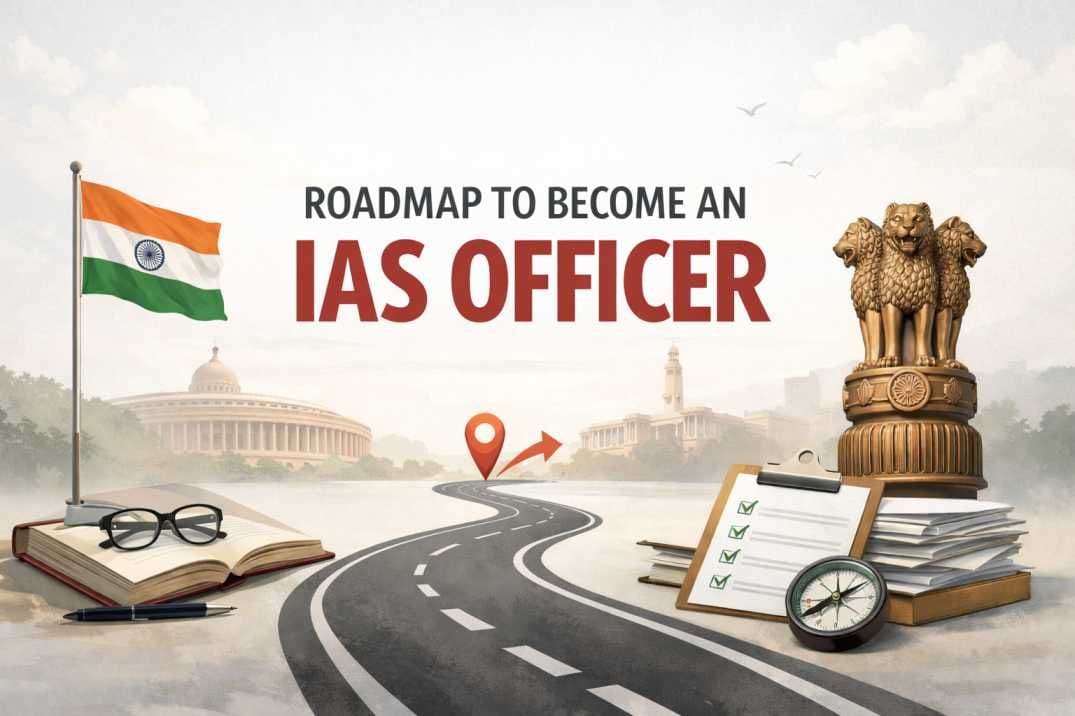Steps for Essay Writing in Civil Service Mains Exam
Feb, 2025
•9 min read
Wish to craft essays that leave UPSC examiners floored? You know, the kind where they mutter, "Wow, this candidate truly understands the issue!" Well, that dream can become reality.
Mastering essay writing in the UPSC exam is all about strategic planning and a sprinkle of brilliance. But here's the catch: you need to present your ideas in a clear, concise, and well-structured manner. Don't worry, we'll break it down for you step-by-step.
Introduction to Essay Writing in Civil Service Mains Exam
The UPSC Civil Services Mains exam throws a variety of challenges your way, and the essay writing in the UPSC exam is no exception. Essay writing was introduced to the CSE in the year 1950 by the Ashok Chanda Committee to assess analytical thinking and communication skills.
This essay writing in the UPSC exam holds significant weight, carrying a whopping 250 marks towards your final score – that's an increase from the previous 200 marks!
Here's how the UPSC Main Exam essays will be structured:
- Format: You will have to write two essay questions within a 3-hour window. The essay paper is divided into two sections: A and B, each with a choice of 4 essays. Each essay should be between 1000 and 1200 words, giving you ample space to showcase your analytical and writing skills.
- No Syllabus, Boundless Topics: The Essay Paper doesn't have a set syllabus. But that doesn't mean you're flying blind. The UPSC expects essays on a wide range of topics, most often drawn from current affairs, social issues, governance, and even historical or philosophical themes.
Before you dive into specific strategies for tackling essay writing in the UPSC exam, it's crucial to understand the fundamentals that make a great essay. After all, knowing what to aim for is half the battle won.
How is Essay Writing Important in the UPSC?
Now that you know the weightage of the Essay Paper in UPSC Mains, let's delve deeper into the art of crafting powerful essays.
What exactly is an essay? In simpler terms, an essay is a piece of writing that explores a particular topic in a structured and analytical way. There are different essay types, each with its purpose. However, the UPSC Mains focuses on formal essays.
Formal essays are all about clear, concise arguments presented in a structured and professional manner. This is exactly what the UPSC examiners are looking for.
Formal essay writing in the UPSC exam plays a pivotal role in the UPSC exam for several compelling reasons.
- Structured Analysis: Formal essay writing in the UPSC exam demands a clear structure, forcing you to organize your thoughts logically. This skill is essential for future administrators who need to tackle complex issues and present solutions effectively.
- Critical Thinking: Formal essays go beyond mere description. They require you to analyze a topic, consider various perspectives, and present well-reasoned arguments. This is exactly what the UPSC wants to see – your ability to think critically and form your own informed opinions.
- Communication Prowess: Formal essay writing in the UPSC exam is all about using clear and concise language. You'll need to express complex ideas in a way that is easy for the examiner to understand.
Alright, so now that we know why essay writing is indispensable for UPSC, how do we actually go about planning and preparing for them? Let's break it down step-by-step.
Planning and Preparing for Essay Writing in the UPSC Exam
Essay writing in the UPSC examination can feel daunting, but with the right approach, you can turn it into your strength. Here's a breakdown of the key steps to planning and preparing for high-scoring essays in the UPSC exam:
1. Choosing the Right Topic
- Read all the options carefully and identify the ones you understand best.
- Consider your strengths. Are you better at analytical essays or persuasive ones? Choose a topic that allows you to showcase your skills.
- Don't be afraid of unconventional topics. As long as you can present a well-structured and insightful argument, you can score well.
2. Brainstorming and Outlining
Brainstorming techniques and clear outlines can help transform your thoughts into a well-structured, winning essay. Let's explore some ways to do it.
|
Technique |
Description |
|
Mind Mapping |
Connect ideas using a central theme and branches. |
|
Clustering |
Group related keywords or phrases together. |
|
Freewriting |
Write continuously without stopping or editing. |
|
Questioning |
Ask open-ended questions about the topic. (Why? How? What if?) |
|
Reverse Brainstorming |
Consider why your topic might be wrong or impractical. |
|
PESTLE Analysis |
Look at the Political, Economic, Social, Technological, Legal, and Environmental factors. |
Wish you had a personal mentor to guide you through essay brainstorming and outlining?
SuperKalam is here for you! SuperKalam offers personalized UPSC mentorship to help you brainstorm essay outlines, develop strong arguments, and succeed in essay writing.
3. Writing Style
- Clarity: Use simple, clear language that's easy to understand. Avoid jargon and complex sentences.
- Cohesion: Ensure smooth transitions between ideas. Use logical connectors and pronouns to make your essay flow seamlessly.
- Simplicity: Avoid flowery language or unnecessary embellishments. Focus on delivering your message effectively.
Also watch: Perfect Strategy for Mains Answer Writing | A Complete Guide | SuperKalam
4. Thesis Statement Formulation
Your thesis statement is the heart of your essay. It's a concise sentence that summarizes your central argument or position on the chosen topic. Craft a clear and compelling thesis statement to guide essay writing in the UPSC exam.
5. Be Informed on Current Events and General Knowledge
The UPSC examiner values well-rounded candidates. Here are some resources to strengthen your knowledge while essay writing in the UPSC exam:
|
Category |
Resources |
|
Reference Books |
|
|
Newspapers |
|
|
Magazines/Channels |
|
Alright, let's get down to the actual writing!
Writing Essay for the UPSC Mains
You’ve brainstormed great ideas and created a solid outline. Now, it’s time to turn that into an impressive UPSC essay!
You have chosen an essay topic; “A ship in harbor is safe, but that is not what a ship is for.” (UPSC CSE Exam in 2022)
Here are some key strategies to follow for essay writing in the UPSC exam:
1. Crafting a Probing Introduction
- Hook the Examiner: Grab attention with an interesting fact, quote, or anecdote related to your topic. This sets the tone and piques interest.
- Introduce the Topic: Clearly define key terms and outline the scope of your essay. Let the examiner know what to expect.
- Thesis Statement: Present your main argument in a clear, concise sentence. This is the roadmap for your essay.
Here’s the central theme for the topic you choose: The essence of this quote is the importance of taking risks and venturing out of our comfort zones to achieve our full potential.
After brainstorming, you can understand that in the proverb:
- Ship is a metaphor for life (be it as career choices, personal development, or societal progress, choose the one that resonates most with you)
- Harbor represents safety and comfort
- The open sea symbolizes challenges, exploration, and growth
2. Developing Body Paragraphs
- One Argument Per Paragraph: Focus on one point, ensuring each builds logically.
- Evidence: Support arguments with examples, data, or case studies.
- Address Counter-Arguments: Consider opposing views, and provide well-reasoned responses for balance.
Once you understand what to go with, form the following:
Arguments For and Against:
- For venturing out: Growth through challenges, discovering new possibilities, achieving goals, and meaningful contributions.
- For staying safe: Stability, security, calculated risks vs. recklessness, and comfort zone fulfillment.
Examples:
- Positive: Risk-taking historical figures (e.g., explorers, inventors), overcoming challenges for unexpected success.
- Negative: Businesses becoming obsolete due to resistance to change, individuals held back by fear of failure.
Now that you're settled, grab your pen and start writing!
3. Creating a Structure
The structure is the backbone when it comes to essay writing in the UPSC examination.
- Start with a captivating introduction that captures the reader's attention and introduces the topic.
Example: Here you have to introduce the metaphor of a ship in a harbour representing comfort and safety. Introduce the quote "A ship in harbour is safe, but that is not what a ship is for" and its significance.
- Dedicate each body paragraph to a specific point supporting your thesis. Use relevant examples and evidence to back up your claims.
Example: Here you can discuss the benefits of leaving comfort zones, citing progress examples. Balance risks with safety and responsible decisions. Emphasize growth despite safety, nurturing through challenges.
- Conclude by reiterating your thesis and summarizing the key points of your essay. Leave the reader with a final thought or call to action.
Example: You should conclude your essay by reiterating your thesis and emphasizing balancing security with exploration. End with a quote or call to action, encouraging readers to embrace challenges and strive for their full potential.
4. Concluding the Essay
- Summarize Your Arguments: Recap the main points you've made. Remind the examiner of your central thesis.
- Offer Solutions (Optional): Depending on the topic, suggest practical solutions or future directions.
Also, check out this playlist: Daily Answer Writing for UPSC Mains 2024-25 | SuperKalam | Arpita Sharma
So, you've got most of the bases covered; let's explore how adding depth and diversification can give your essay an extra edge.
Adding Depth and Diversification to Your UPSC Essay
You've poured your heart and soul into your essay, but there's room for even more! Here are some ways to add depth to your writing and impress while essay writing in the UPSC exam:
1. Incorporating Multiple Dimensions
- Social Aspects: Discuss the social implications of your topic. How does it affect different communities or social structures?
- Economic Aspects: Highlight the economic impact. What are the financial consequences or benefits?
- Political Aspects: Consider the political angle. How do government policies or political dynamics influence the issue?
2. Using PESTLE Analysis for Broader Perspectives
Recall the PESTLE analysis from brainstorming. Reanalyze the essay topic through Political, Economic, Social, Technological, Legal, and Environmental factors for broader perspectives and potential solutions or consequences.
3. Upholding Constitutional Values and Avoiding Generalizations
Aspiring civil servants must uphold constitutional values. Ensure UPSC essays avoid generalizations and bias, presenting a balanced, inclusive viewpoint in line with India's constitutional spirit.
Struggling to write clear and impactful UPSC essays that stand out?
SuperKalam provides personalized feedback on your writing style and communication skills. This ensures your essays are clear and concise, and leave a lasting impression on UPSC examiners.
That being said, don’t submit just yet! Let’s make sure your hard work truly shines by revising and finalizing it properly.
Revising and Finalizing the Essay
You've crafted a compelling essay, but the work isn't over yet. Revision is the final step to ensure your UPSC essay shines.
Here are some key techniques to help you with essay writing in the UPSC exam:
1. Revise
- Don't Skim, Dive Deep: Comprehensive revision is essential. Take time to re-read your essay critically, ensuring a logical flow of arguments and a clear connection to your thesis statement.
- Grammar: Proofread meticulously for grammatical errors, typos, and inconsistencies in sentence structure. Remember, a well-written essay showcases your attention to detail.
- Coherence: Ensure your arguments flow smoothly and transition seamlessly between paragraphs. Eliminate any abrupt jumps in thought and strengthen the overall coherence of your essay.
Also watch: This AI platform will help you evaluate your UPSC Mains Answer in 60 Seconds (For Free)
2. Final Touches
- Word Limit: Respect the word limit! Carefully review your essay to ensure it falls within the prescribed word count.
- Presentation: First impressions matter! Present your essay neatly and legibly. Maintain a consistent handwriting style or use a clean, easy-to-read font if using a computer.
Now, let's take a look at some crucial tips and watch out for common mistakes that could trip you up at the last minute.
Essential Tips and Common Pitfalls
To excel in the UPSC essay paper, strategic planning and avoiding common pitfalls are crucial alongside strong writing skills. Let's explore some essential tips for essay writing in the UPSC examination:
- Study previous years' UPSC essay papers and analyze toppers' essays for insights into structure and argumentation.
- Explore social, economic, and political perspectives for a balanced analysis of topics.
- Allocate around 1 hour 20 minutes for each 125-mark essay, allowing time for revising.
- Collect relevant quotes and anecdotes to enhance the depth of your essays.
Want to gain an edge on UPSC essay writing and connect with a community of 10,000+ fellow aspirants?
Join the SuperKalam UPSC Mentorship Telegram channel!
Okay, now that you're armed with these tips, let's wrap things up and bring it all together.
Conclusion
You've explored powerful strategies and essential tips to conquer essay writing in the UPSC Mains exam. Remember, a well-written essay can be the tipping point in securing your dream rank. By following these tips, you'll be well on your way to crafting exceptional essays that set you apart from the competition.
Ready to take your essay writing in the UPSC exam to the next level? SuperKalam's expert faculty, proven methodologies, and focus on personalized learning ensure you receive the support and guidance you need to write impactful and high-scoring essays.
SuperKalam provides UPSC-specific resources, real exam-like practice tests, and expert feedback for mastering UPSC essays!


